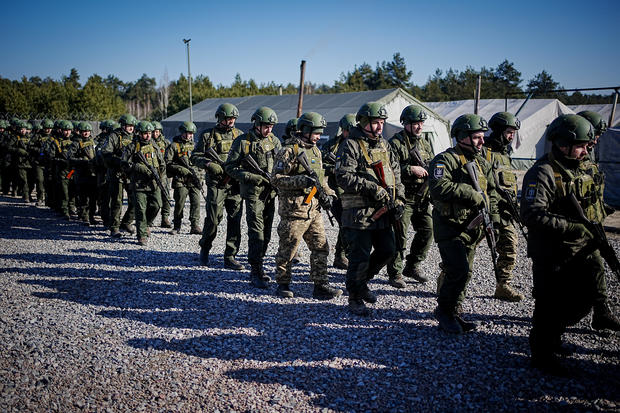With the war in Ukraine entering its second year — and the U.S. continuing to provide the embattled country with military aid in the form of rockets, guns and ammunition — the Pentagon is stepping up production of critically-needed supplies.
“For a couple of key items, the stockpile is getting low,” retired Marine Col. Mark Cancian, with the Center for Strategic International Studies (CSIS), told CBS News.
Cancian said Ukraine’s use of artillery shells far outstrips the Pentagon’s capacity to make them.
“They’re using about as much in a month as we produced in the year,” Cancian said.
Kay Nietfeld/picture alliance via Getty Images
Precision-fired munitions for the long-range HIMARS system are another need, so Lockheed Martin is gearing up to turn out one new rocket every 10 minutes at its plant in Arkansas.
The U.S. has committed $30 billion in weapons to Ukraine — but just a fraction of the Pentagon’s staggering $858 billion defense budget.
“This is darn close to being the biggest defense budget that we have ever had,” Loren Thompson of the Lexington Institute, a public policy think tank, told CBS News.
Since World War II, the only time the U.S. has spent more on defense than it is now was at the height of the wars in Iraq and Afghanistan. And, according to Thompson, nearly one-third of the current defense budget is spent on weapons.
“That is an amount of money that outstrips the entire economy of most European countries,” Thompson said.
And with the U.S. struggling to keep Ukraine supplied in its fight against a decrepit Russian military, there is concern about what could happen if the U.S. were to become involved in a conflict with China. CSIS recently conducted a war game that showed that the U.S. would run out of a key weapon — Long Range Anti Ship Missiles (LRASM) — while trying to stop a Chinese invasion of Taiwan.
“The U.S. ran out of these missiles in the first few days of the war,” Cancian said of the war game.
Even though it ran out of some missiles, the U.S. was still able to stop the Chinese invasion in the war game. Dozens of ships, hundreds of aircraft and thousands of troops were lost, however, Cancian said.
